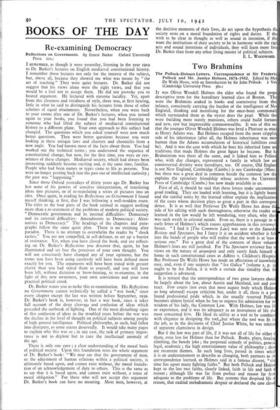BOOKS OF THE DAY
Re-examining Democracy
Reflections on Government. By Ernest Barker Oxford University Press. 21s.) I REMEMBER, as though it were yesterday, listening in the year 1910 to Dr. Barker's lectures on English mediaeval constitutional history. I remember those lectures not only for the interest of the subject, but, above all, because they showed me what was meant by " the art of teaching." They were quiet lectures. Dr. Barker did not suggest that his views alone were the right views, and that you would be a fool not to accept them. He did not provoke you to heated argument. He lectured with extreme lucidity. Yet, apart from this clearness and vividness of style, there was, at first hearing, little in what he said to distinguish his lectures from those of other scholars of equal attainments. Nevertheless, when you went back to your rooms after one of Dr. Barker's lectures, when you turned again to your books, you found that you had been listening to someone who had lifted the subject of mediaeval constitutional history to a different plane. Your own approach to this subject had changed. The questions which you asked yourself were now much better questions. They were better questions because you were looking at these antique laws and charters and chronicles from a new angle. You had known most of the facts about them. You had worked out the technical terms ; you understood the sequence of constitutional change, but now, for the first time, you were an eye- witness of these changes. Mediaeval society, which had always been interesting, suddenly become exciting and, at the same time, familiar. People who had been names or types came to life as persons. You were no longer peering back into the past out of intellectual curiosity ; the past was " happening."
Since those Oxford yesterdays of thirty years ago Dr. Barker has lost none of his powers of sensitive interpretation, of translating ideas into pictures, or of re-translating a series of pictures into an idea. Once again, in reading his Reflections on Government I found myself thinking, at first, that I was following a well-trodden route. The titles to the four parts of the book seemed to suggest nothing more than a re-statement of the problems of modern political society. " Democratic government and its internal difficulties: Democracy and its external difficulties: Amendments to Democracy : Alter- natives to Democracy." The headings of the chapters and para- graphs follow the same quiet plan. There is no straining after paradox. There is no attempt to overwhelm the reader by " shock tactics." You are not compelled, in self-defence, to set up a barrier of resistance. Yet, when you have closed the book, and are reflect- ing on Dr. Barker's Reflections you discover that, again, he has illuminated and set free the processes of your own thought. You will not consciously have changed any of your opinions, but the terms you have been using carelessly will have been defined more exactly for you. The arguments will have been stated with greater clarity than you had stated them to yourself, and you will have been left, without dictation or brow-beating, to re-examine, in the light of this new awareness, your own convictions and your own practical political creed.
Dr. Barker wants you to make this re-examination. His Reflections on Government cannot technically be called a " war book," since every chapter except the last was written before September, 1939. Dr. Barker's book is, however, in fact a war book, since it takes full account of the deep cleavage and confusion of • ideas which preceded the outbreak of fighting. One of the most disturbing signs of this confusion of ideas in the troubled years before the war was the decline in the level of thought on political subjects among people of high general intelligence. Political philosophy, as such, had fallen into disrepute, to some extent deservedly. It would take many pages to explain why this was so ; in any case, the task of primary impor- tance is not to deplore but to cure the intellectual anomaly of the age.
There is only one cure ; a clear understanding of the moral basis of political society. Upon this foundation rests the whole argument of Dr. Barker's book: " We may say that the government of man, or the adjustment of human relations within a political society, is ultimately based upon, and cannot exist without, the moral founda- tion of an acknowledgement of duty to others. This is the same as to say that it is based upon, and cannot exist without, a sense of moral obligation." For those who will not accept this argument Dr. Barker's book can have no meaning. Most men, however, at the decisive moments of their lives, do act upon the hypothesis t society rests on a moral foundation of rights and duties. If th wish to be clear in thought as well as sound in intention, if th want the institutions of their society to be in harmony with the rig acts and sound intentions of individuals, they will learn more fro Dr. Barker than from any other living master of political subjects.
E. L. WoODWARD.


























 Previous page
Previous page